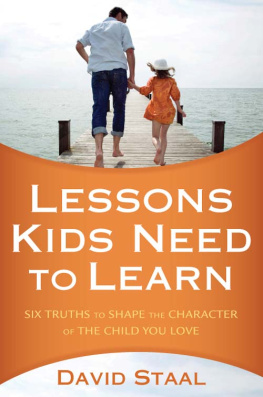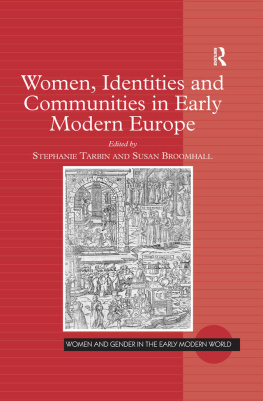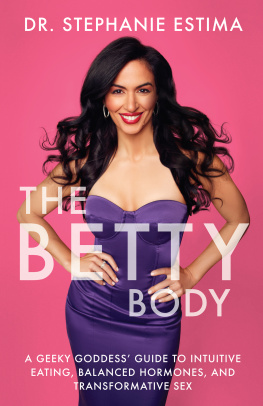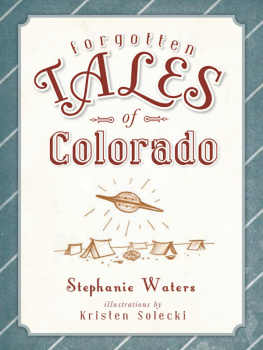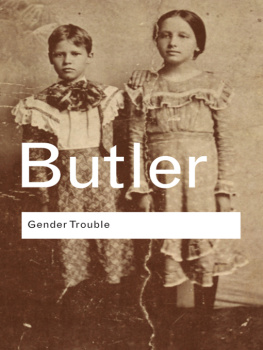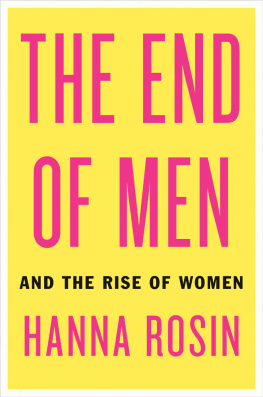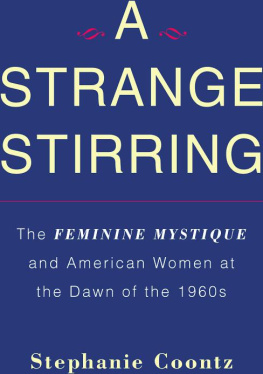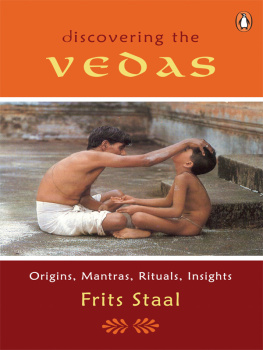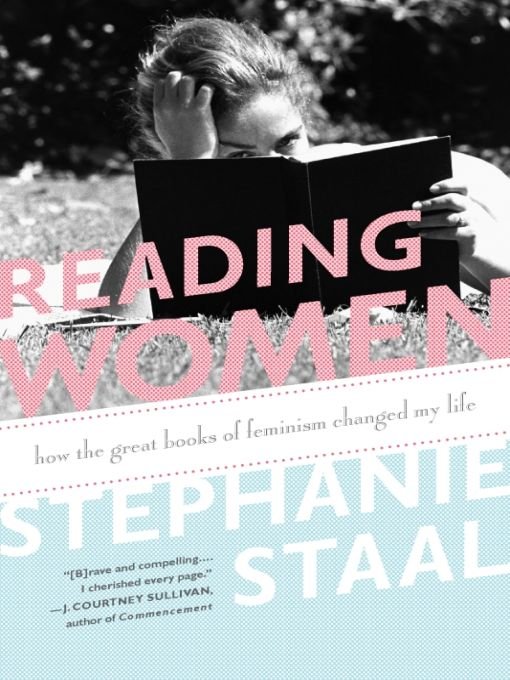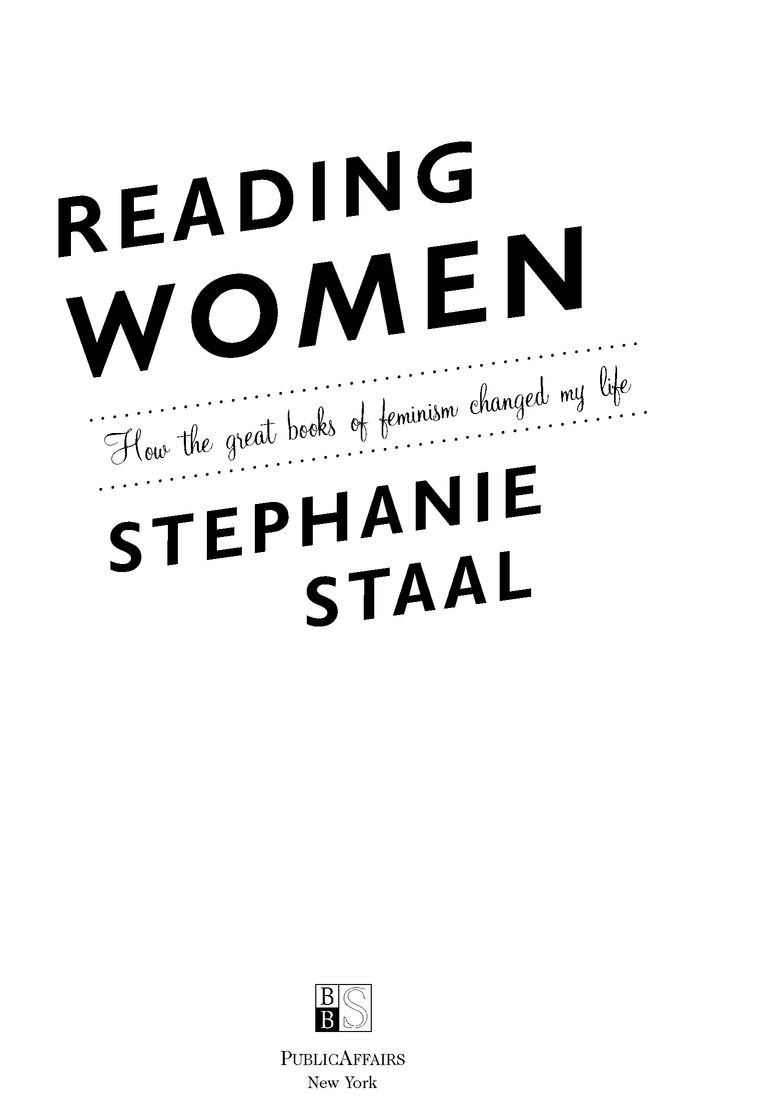Table of Contents
For Sylvia
When a subject is highly controversialand any question about sex is thatone cannot hope to tell the truth. One can only show how one came to hold whatever opinion one does hold. One can only give ones audience the chance of drawing their own conclusions, as they observe the limitations, the prejudices, the idiosyncrasies of the speaker.
VIRGINIA WOOLF, A Room of Ones Own
PREFACE
I graduated from Barnard, an all womens college in New York City, in the early 1990s. As a woman born in the 70s, who came of age in the 80s, I entered adulthood with a certain set of expectations. The ideals of feminism were not so much a crescendo that crashed through my life but rather the steady beat to which I grew up. Anything boys could do, girls could dobetter. To me, feminism was evolution, not revolution. Many of the achievements that women only a generation ago might have viewed as groundbreaking, I took for granted. Of course, women could be doctors and lawyers, run governments and corporations. In college, these assumptions accepted during my youth were emphasized, underlined, spoken aloud; indeed, attending a single-sex college, in which our gender was treated as a glory, the opening up of opportunities for women appeared not so much as options but mandates. We were, all of us on that graduation day almost two decades ago, poised to take over the world.
Life, however, is not lived by directive, and there has been much talk in recent years of the false promises of feminism, the disillusionment and disappointments, the lash and backlash, especially for those of us who married, who became mothersor perhaps it has always been thus? Each generation, I suppose, forges new paths over the same old terrain. The role of feminist has never been easily reconciled with that of wife and mother, particularly in the public eye, but neither, its true, has it rested easily in the privacy of our own homes. Parental love and professional ambition make for uneasy allies. And for my generationwomen empowered by feminism as our due coursethe contradictions can strike at the heart of who we are, or at least the way we see ourselves. The same women who grew up believing we could have it all now understand the toll of the transformations into wife and mother, the ambiguities and compromises they raise, the pledges broken both to ourselves and to others, the stark realization that perhaps we are not the heroines we once thought we were.
It was only after I got married and became a mother that I fully grasped the common refrain that the older you get, the less you know. Motherhood introduced a new range of emotions, from crazy love to mad frustration, emotions I could never have imagined that changed the tenor of my existence. As a mother, linked to my child in a million ways, I could not ignore the difficulties of applying my feminist ideals to my lifes realities, yet I could not turn my back on feminism, either; I could not throw out the baby with the bathwater, so to speak. I longed to fashion my own incarnations, the personal with the political. In those early years, I thought a lot about the young woman captured in the graduation photo on my wall, brimming with hopes about the future, always sensing the framed glass that separated us. But to say I started this book in search of her, and ended up finding myself, is only part of my story.
PART I
DISCOVERY
Curiously enough, one cannot read a book; one can only reread it. A good reader, a major reader, an active and creative reader is a rereader.
VLADIMIR NABOKOV, Lectures on Literature
Understanding Backwards
2:47 A.M.
My daughters thin wail slices through the silence, waking me from an already fitful slumber. I roll over and squint at the clock beside my bed, then close my eyes and lie very still, hoping her cries will subside. Already, though, it is too late. My heart is beating faster, humming through my body, an engine of awareness. Her cries grow louder, more insistent. Finally, she calls out my name. Mama. Maaa-Maaa . My feet touch the wood floor, hard and cold, navigating the path from my bedroom, down the hallway, to my daughters bedroom. From her window, I can see the moon, round like an owls eye.
She is lying in her crib, favorite blanket wrapped and knotted around her small body. Sweat plasters her hair to her head like a golden cap, and her cheeks are flushed, blooming bright pink. Instantly, my chest floods with love and concern. Her eyes swerve back and forth beneath closed lids and crinkled little brow. She has had a nightmare. I scoop her up in my arms and carry her back to my bedroom, first laying her gently in the middle of the bed and then crawling in next to her. My husband, John, raises his head and glances over at us through sleep-encrusted eyes, then groans and flops over onto his stomach, pulling the blanket around his ears. My daughters forehead is damp against my chest, and her arms and legs cling to me with surprising strength, her grip desperate, as if she were trying to press her way inside of me, make us one. Our skin sticks together, damp from the warmth. I rock her, singing softly under my breath. She smells of milk and lotion, sweet and sweaty. My touch soothes her, I can tell; her lips are slightly parted now, her eyes at rest, and her fists uncurl from tight buds on my chest to flowers, the fingers loose and curled slightly upward.
Its a weird power, this effect of mother on child. I am still getting used to it. Soon she is asleep, her breathing shallow and rhythmic. Fearful of waking her, I silence the twitch in my muscles, allowing my arms and legs to go numb. Inside, though, the thoughts swirl. I am a mother, a wife, andfor a moment, my imagination fails me. As dawn breaks, sunlight creeping up the bedroom walls, I am still awake, wondering how I got here, to this place.

How familiar the plot: And then I got married, had a baby, and everything changed. Part of me understood perfectly how I arrived in that bed, a child entwined around me as if another limb, while I myself felt adrift. Even before I became a wife and mother myself, I had heard how this particular story unfolded. Like many women who came of age between the second and third waves of feminism, I had been taught that throughout the ages, the transitions into marriage and motherhood were the vulnerable points at which we might lose our voices, might cease to be the narrators of our own lives.
But, lucky for us, feminismwith its emphasis on equality and empowermentoffered women a different plot, with a different ending. I happily subscribed. I worked like a dog in college, winning honors, awards, and coveted internships, then landed a fairly glamorous job upon graduation as a literary scout for foreign publishers and Hollywood producers. A few years later, I enrolled in a masters program in journalism and then worked as a newspaper reporter, my stories regularly appearing on the front page of the features section. At nights I worked on a book proposal, and when a major New York publisher made me an offer, I took leave of my job to finish it. During this time, I married a progressive and supportive man, the kind of man who, when I informed him I would not be changing my last name to his after the wedding, responded with genuine surprise, Why would you? Yet not so long after John and I married and Sylvia was born, I found myself in the midst of an identity crisis much like our feminist foremothers had described, feeling especially disquieted given that I, perhaps naively, had not quite expected it would happen to



